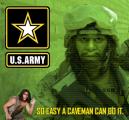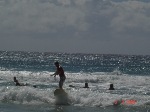The War Within: The Shadow General
'You're Not Accountable, Jack'
How a Retired Officer Gained Influence at the White House and in Baghdad
By Bob Woodward, Washington Post Staff Writer
Retired Army Gen. Jack Keane came to the White House on Thursday, Sept. 13, 2007, to deliver a strong and sober message. The military chain of command, he told Vice President Cheney, wasn't on the same page as the current U.S. commander in Iraq, Gen. David H. Petraeus. The tension threatened to undermine Petraeus's chances of continued success, Keane said.
Keane, a former vice chief of the Army, was 63, 6-foot-3 and 240 pounds, with a boxer's face framed by tightly cropped hair. As far as Cheney was concerned, Keane was outstanding -- an experienced soldier who had maintained great Pentagon contacts, had no ax to grind and had been a mentor to Petraeus. Keane was all meat and potatoes; he didn't inflate expectations or waste Cheney's time.
By the late summer of 2007, Keane had established an unusual back-channel relationship with the president and vice president, a kind of shadow general advising them on the Iraq war. This September visit was the fifth back-channel briefing that Keane had given the vice president that year.
As Keane was laying out his view, President Bush walked in.
"I know you're talking to Dave," Bush said to Keane. "I know that the Joint Chiefs and the Pentagon have some concerns." The JCS had not favored the surge of 30,000 troops that Bush had decided was essential to quell the escalating violence in Iraq; the chiefs were deeply worried that the surge left no strategic reserve for an unexpected crisis elsewhere.
Keane repeated what he had just told Cheney: The JCS and Adm. William J. Fallon, Petraeus's boss at Central Command, were insisting on studies and reports to justify even the smallest request for more resources for Iraq. Their persistent pressure, pushing Petraeus for a faster drawdown, was taking its toll.
"There is very little preparation," Keane said, "for somebody who grows up in a military culture to have an unsupportive chain of command above you and still be succeeding. You normally get fired." The result, he said, is that Petraeus "starts to look for ways to get rid of this pressure, which means some kind of accommodation."
Bush said he wanted Keane to deliver a personal message to Petraeus from his commander-in-chief. After Bush laid out his thoughts, Keane went to the large West Wing lobby, sat among the couches and chairs and wrote out the president's words.
National security adviser Steven J. Hadley and Defense Secretary Robert M. Gates did not know of the president's back-channel contact with Petraeus. When I asked the president in May 2008 about his message, Bush explained why he had felt a need to send it.
The senior military leadership in Washington, though unaware of the extent of Keane's role, was uncomfortable with his frequent visits to Iraq and his influence at the White House.
Gen. George W. Casey Jr. was one of them. After serving as Iraq commander for two years, he had handed over the job to Petraeus in early 2007. Casey was now Army chief of staff and a member of the Joint Chiefs. It was a promotion and a kind of soft landing, but he had left Iraq feeling he had lost Bush's confidence.
In the summer of 2007, Casey was at Walter Reed Army Medical Center in Northwest Washington, waiting for a routine physical, when he spotted Keane standing in line at the radiology desk.
The two generals locked eyes for a moment, then Keane turned away, as if he hadn't recognized Casey.
"Hi Jack, how are you?" Casey said, extending his hand. He had been waiting for a moment like this. "Has the chairman called you yet?"
"No, why?" Keane asked.
"Because we feel -- the chiefs feel -- that you are way too out in front advocating a policy for which you're not accountable. We're accountable. You're not accountable, Jack. And that's a problem."
Keane said he had taken action as a member of the secretary of defense's policy board, whose members were supposed to offer their independent advice. All he was trying to do was help Petraeus, he said. "I supported this strategy for three years when a lot of other guys didn't," Keane said, referring to Casey's strategy to build up the Iraqi security forces in hopes of a speedier withdrawal of U.S. troops. "And at some point, I no longer could support it. I'm not operating as some kind of Lone Ranger."
"It's not appropriate for a retired general to be so far forward advocating a policy that he is not responsible or accountable for," Casey said again.
"I'll take your counsel," said Keane, but he didn't suggest he would act any differently.












Bookmarks